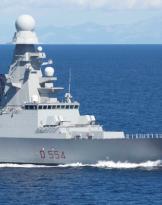These days the European Union is discussing the future military strategy. The initiative in question is called "Strategic Compass" and, as the name implies, should set the course for the future of the European Union in the military and beyond. It is talked about in the main international forums and in think tanks of France, Germany, Spain and ... then let's try to understand together what it is and why it is important.
Lo Strategic Compass it is one of the most important and debated initiatives regarding the Security and Defense of the European Union during the current German presidency of the European Council.
The initiative aims to formulate a first joint analysis of the risks related to security and defense of the EU, to find an agreement on clear and achievable strategic objectives to strengthen the union and should also serve as a political guide for the future process of military planning. The document highlights the challenges, ideas and recommendations regarding the four baskets identified: crisis management, resilience, capacity building and partnership.
On the DGAP (German Council of Forein Relations - German Society for Foreign Policy), the main independent German forum active since 1945 that deals with the country's foreign policy, on 11 November a summary article was published on the EU Strategic Compass, together with the report. From the article we learn that on 21 September the DGAP and the German Minister of Defense hosted a workshop on EU Strategic Compass and his four baskets. The main ones were invited to the event think-tankers Europeans.
The debate was guided by three basic questions:
- which topics should be treated strategically in the four thematic baskets?
- is it possible to identify points relating to the different perception of risk by individual member states?
- what measures are necessary so that the initiative (the Strategic Compass) can represent a real added value for the European Union?
The discussion allowed to deepen the strategic issues relating to security and defense of the European Union, identifying some key elements transversal to all four baskets.
These are general concepts
The first of these relates to the expansion of the EU agenda for security and defense issues. This expansion concerns both the number of crises in Europe, the ever-increasing number of new capacities to be developed, and the complexity of the domains in which one operates.
The second concept concerns the expectation or expectation that rests on the capacity of the Strategic Compass to act as a guide. Indeed this should be the fundamental purpose.
Finally, it was pointed out that the success of this initiative goes back to the willingness of the member states to want to improve things, guaranteeing a follow-up. It is not possible to think that at the end of the German semester the initiative will stand on its own, the commitment of the member states for the next two years, at least, must be guaranteed.
The discussion also revealed some recommendations summarized below:
- There is a need to converge on a narrow set of priorities in order to ensure a faster, more united and effective crisis response.
- It is important that the work on the strategic dialogue in 2021 continues in the right way before thinking about restructuring existing instruments and institutions.
- Progress made under the Strategic Compass, highlighting the findings through additional documents, such as a plan for updating and implementing security and defense, as well as the use of better tools to ensure consistency and compliance.
- Whenever possible, the principle of subsidiarity must be applied, but the resilience of the European Union can only be achieved through the interaction of different levels and actors: between EU institutions, between EU and member states, between public and private sectors, between civilian and military actors, between the EU and NATO.
- In the context of capacitive development, it is very important to employ the consensual nature of the Common Security and Defense Policy (CSDP) to work closely with member states who prefer to employ the NATO Defense Planning Process (NDPP). It is necessary to ensure that the objectives established by the European Council are taken into account by the member states.
- We need to start asking ourselves how the process of prioritizing capabilities can be simplified and how to strengthen political structures and the integration of military expertise without changing the treaties and without upsetting the existing institutional landscape.
- Partnerships need to be prioritized based on their ability to achieve well-defined goals.
- Finally, the EU, NATO and the UN need to be truly complementary. Addressing and defining the problem of the division of labor between partners, both between EU members, both within the EU, and between civilians and military, with regard to resilience and crisis management.
It is easy to understand that behind each of the recommendations there is a world of interests linked to the development of society in the European Union, not only military but also and above all civilian.
To give an example, the strengthening and division of tasks between international organizations (in point eight) will have implications for the definition of guidelines in the development of the defense industry (European but also, potentially, worldwide). The same consideration can be made (on point five) regarding the capacitive development process. Who among the states will be able to better interpret future regulations will be better able to guarantee developments in the national supply chain. It may sound selfish, but it is.
When we talk about security we refer implicitly or explicitly to the Industrial and Technological Base of Defense. Who will best be able to direct European investments will be more able to facilitate national industry, from a European but still national perspective.
That is why it is necessary to participate in discussions by all means, to share information with think-tank national and European and, ultimately, make "influence".
It is not certain that the initiative will continue with the next change of the six-month presidency of the European Council, but what is the alternative? Starting over for the next six months, and then again for the next ones and so on? Let's think about it ... because it means wasting time and work, and in the meantime other countries are moving forward, both in Europe and, above all, in the rest of the world.
In Italy, is it perhaps too busy with "household chores" to look beyond one's nose? This behavior is often the cause of our ills: let's not complain if other countries decide for us!
To learn more:
- 'Strategic Compass': EU considers military doctrine, new tank development | Reuters
- Strategic Compass: Developing strategic principles - EU2020 - EN
- The EU's Strategic Compass and Its Four Baskets | DGAP
- The EU's Strategic Compass - GERMAN-FOREIGN-POLICY.com (german-foreign-policy.com)
- Can the EU's Strategic Compass steer European defense? | Center for European Reform (cer.eu)
- 'Strategic Compass': EU considers military doctrine, new tank development - Metro US












